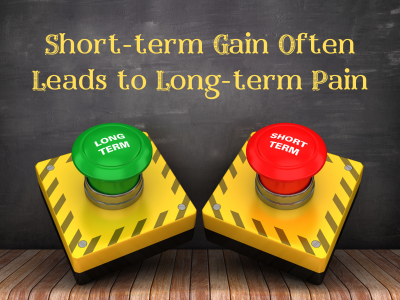When you shop when you’re hungry, you tap into the energy of scarcity and desperation and jump at the first thing that will fill your stomach. This can be something you don’t even like and it very likely will lead to regret after your hunger is satiated.
Similarly, it’s not a good idea to make a decision when you’re desperate for a solution. When you tune into the energy of fear and hopelessness, you can very likely pick up the first thing that comes your way so you can get relief. But when you don’t consider the long-term impact of the easy choice, it can come back to bite you.
A client had planned a holiday with her family. At the last minute, the caregiver who was to come to take care of her mother while the family was gone cancelled. She felt desperate. And decided to drop her mother to her sister’s place even though she knew their relationship was strained. She felt stuck and this was the only option she could think of or cancel her vacation.
So what should one do in urgent situations? The immediate need does need to be addressed.
Look for a temporary solution that meets your most important needs (for example, safety, quality support, ease of access, etc.) even if it is difficult. Perhaps it is more tiring, more expensive or more challenging. Perhaps you need to reach out to your support systems for help. Remember, this is temporary. If you clarify, communicate, request, and honour your word, most people are willing to help.
By holding back and not jumping on the easiest option, you will not compromise on what you value in the long run. And it will buy you enough time to look for a long-term solution that will work for you in ways that nourish and support you.
After some coaching work together, the client acknowledged that her most important needs were her mother’s peace and happiness. And if she chose the easiest path, she wouldn’t enjoy her vacation very much as she would be worried for her mother. Should she cancel her vacation then?
I asked her about her strengths, and her social network was one. It struck her that she could ask if any of her friends (whom her mother also got along with) could come and stay at her home for a few days.
She reached out to a friend and to her surprise, her friend agreed immediately. The client could enjoy her holiday. The mother was comfortable. And the friends’ relationship grew stronger.
What do you think? Have you ever made a decision for short-term gain only to experience long-term pain? What could have been an alternative route?

